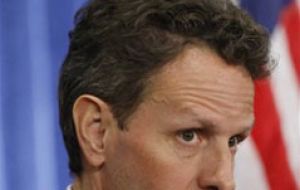MercoPress. South Atlantic News Agency
Geithner unveils 1.5 trillion bail-out plan and toxic fund
 Treasury Secretary Timothy Geithner
Treasury Secretary Timothy Geithner Treasury Secretary Timothy Geithner has unveiled a comprehensive bank bail-out plan worth at least 1.5 trillion US dollars. Under the plan, the size of a key Federal Reserve lending program will be expanded to 1 trillion from 200 billion.
In addition, a public-private investment fund of 500 billion will be created to absorb banks' toxic assets and could be expanded to $1 trillion. "Critical parts of our financial system are damaged," Mr Geithner said. "Instead of catalyzing recovery, the financial system is working against recovery, and that's the dangerous dynamic we need to change," he added. The new plan is aimed at restoring confidence in the damaged financial system and restarting bank lending. The key question now is how eager the private sector will be to participate both in the new investment fund and the new Federal Reserve lending programme. Meanwhile, the US Senate has backed an 838 billion economic stimulus package which will now have to be reconciled with the House of Representatives version. Leading US stock indexes fell sharply after Mr Geithner unveiled the new plan, as many analysts expressed scepticism. "It's not big enough. There are few details. The administration is trying to buy time and they don't get the fact that we need to get something yesterday," said Joseph LaVorgna, chief US economist at Deutsche Bank Securities in New York. "Investors want clarity, simplicity, and resolution. This plan is seen as convoluted, obfuscating, and clouded," said James Ellman, Seacliff Capital president. Others say that the plan is not perfect, but in general they agree with many of its proposals. "I think the idea of more or less buying back some of the debt, monetizing it, is a good idea. I think that's probably a good move," said Carl Birkelbach, head of Birkelbach Management. Mr Geithner said the new plan should unfreeze the credit market, strengthen banks and "provide critical aid for homeowners and for small businesses". "And as we do each of these things, we will impose new higher standards for transparency and accountability," he added. He said that the public-private investment fund to buy up risky assets will be seeded with government money. The expanded Federal Reserve lending program will support lending to small businesses and consumers, including credit card lending and student loans, and also cover the troubled commercial real estate market. The government also will give banks access to additional capital from the Treasury's original 700 billion on bail-out fund "as a bridge to private capital". But that will come with strict terms, including full disclosure and limits on executive pay. "This assistance will come with terms that should encourage the institutions to replace public assistance with private capital as soon as that is possible," said Mr Geithner. The government will also provide 50 billion to try to soften the deep housing crisis, which has been having a negative impact on the economy.




Top Comments
Disclaimer & comment rulesCommenting for this story is now closed.
If you have a Facebook account, become a fan and comment on our Facebook Page!